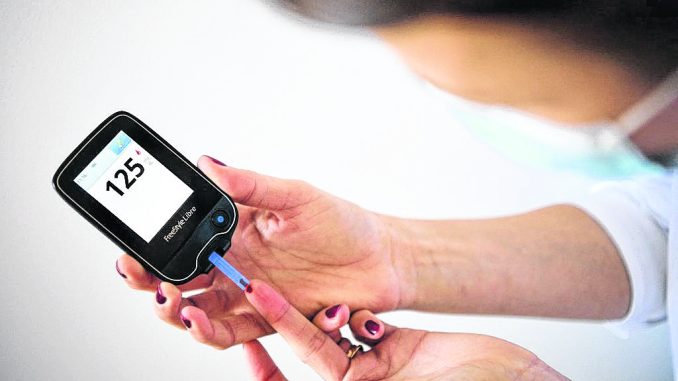
Celebrity endorsements have helped fuel excitement around certain type 2 diabetes drugs, which not only help regulate blood sugar but can also lead to significant weight loss.
“People are excited to go on these medications, because studies show they are very effective at both controlling blood sugar and helping with weight loss,” says Faina Norinskiy, a senior nurse practitioner in comprehensive weight management at Long Island Jewish Valley Stream Hospital.
According to the Mayo Clinic, symptoms of type 2 diabetes often develop slowly. When symptoms are present, they may include increased thirst, frequent urination, increased hunger, unintended weight loss, fatigue, blurred vision, slow-healing sores, frequent infections and tingling in the hands or feet.
Amid all the excitement, there is some confusion around the popular brands Ozempic, Wegovy, Mounjaro and Zepbound.
Ozempic, which contains the active ingredient semaglutide, was approved to treat type 2 diabetes by the Food and Drug Administration in 2017. Wegovy, which is essentially the same drug as Ozempic, was later approved for chronic weight management in patients with obesity only, or for patients who are overweight and have at least one weight-related condition (such as high blood pressure, high cholesterol, or type 2 diabetes).
“The drugs are the same, except the FDA approval and the labeling and marketing are different,” Norinskiy says. Dosages vary, too; Wegovy has been approved at a slightly higher dosage than Ozempic.
Both drugs, which are made by Danish drug manufacturer Novo Nordisk, mimic the action of a hormone called GLP-1 (glucagon-like peptide), which occurs naturally in the body. When blood sugar levels rise after you eat, these drugs stimulate your body to produce insulin, which helps lower blood sugar levels.
“They also slow down the digestive system and help curb your appetite,” Norinskiy says. “Food ends up staying in your stomach for a longer period of time, so you feel fuller and eat smaller portions.”
Next, in 2022, drug maker Eli Lilly and Co. won FDA approval for a competing type 2 diabetes drug, Mounjaro, and later, a weight loss brand called Zepbound. The active ingredient in both Mounjaro and Zepbound is tirzepatide. Similar to semaglutide, tirzepatide mimics the actions of GLP-1, but it also targets a second naturally occurring hormone, known as GIP (glucose-dependent insulinotropic polypeptide), which is also involved in blood sugar control.
“Both Ozempic and Mounjaro are much more potent than the previous generation of diabetes drugs, in terms of both lowering AIC and helping with weight loss,” says Dr. Silvana Obici, chief of the Division of Endocrinology at Stony Brook Medicine and interim medical director of the Stony Brook University Hospital Diabetes Center.
AIC refers to a blood test that measures the average amount of glucose (sugar) in the blood for the past 90 days. The result is listed as a percentage.
Studies have shown that Mounjaro is more effective than Ozempic both in lowering AIC and weight.
“But there is a lot of individual variability,” Obici says. “The effect on AIC or weight is highly individual. Some people don’t respond to one of the drugs, or their response to one or the other is superior.” By trying the drug for three to six months, patients can see how well they do. All of these drugs, which are typically administered once a week by self-injection, work best when combined with healthy eating and exercise.
By helping to control diabetes and promote weight loss, these drugs are also helping patients reduce their risk for heart disease, stroke and kidney disease, Norinskiy says.
Since all the drugs are relatively new, there are no generic versions available yet. This means they are pricey, costing as much as $1,200 or $1,500 per month. While Ozempic and Mounjaro are usually covered by health insurance for diabetics, many insurance carriers do not cover any of the drugs for weight loss.
“Often, it’s specific to the employer if the weight loss drugs are covered or not,” Norinskiy says.
“The obesity community believes there is a lot of bias, in that obesity is seen as a defect in willpower,” Obici says. “But unfortunately, it’s not just a lack of will. When you lose weight through lifestyle changes, your body has response mechanisms in place that fight the weight loss and want to return it to its original weight. These medications help prevent this biological response to weight loss and help people keep the weight off over time.” However, unfortunately, if people stop taking the drug, they typically regain the weight.
Like all drugs, these diabetes and weight loss drugs have side effects and contraindications. The most common side effects are gastrointestinal, such as nausea, constipation, or diarrhea, which are generally mild.
“When educated properly, most patients do really well,” Norinskiy says. “I tell patients that the medication will make them feel full more quickly, and if they start to feel that way, to stop eating. When we overeat, that’s when the nausea comes in.” She added that there are some patients who find the side effects intolerable, but “they are very few and far between.”
Rarely, serious side effects can occur, says Obici. These include pancreatitis and the formation of gallstones.
For much of 2023 and 2024, these drugs have been plagued by shortages in the marketplace. “Many patients who really benefited from them have had to scramble to get them,” Dr. Obici says. However, the FDA recently announced the removal of Mounjaro and Zepbound from the shortage list.

